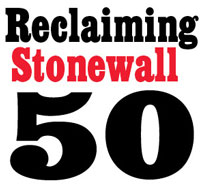When I think about Stonewall, I think about what it takes to be truly heard and seen as a community. And how the challenge of every social movement is for people to first find their voice and then find their way—to translate their voice into political power.
We know we have real power as a community when there are consequences for hurting us. No matter who those hurting us are—police, politicians, corporate executives, people in the media. Hurting us with laws that attack us, business practices that deny us, and media representations that scapegoat and demean us. Consequences, remedies, and systemic changes, not decades later but in the moment. It requires building power at the ballot box and over corporations and getting cultural momentum on our side. That is how we make our communities a force to be reckoned with.
The other side of this equation, however, is checking whether we are using that power well. The standard is simple: Are we using it to protect and lift up everyone in our community? Are we making good on realizing our shared fate as a diverse community? When we fight, are we fighting for everyone equally—for trans folk, for queer women, for queer people of color?
The Stonewall anniversary is an important time to reckon with how we’ve built power and how we’ve used it. To me, the legacy of Stonewall is the mandate to build power and also to share power. It’s the work of making all oppressed people more powerful: both people being oppressed within our community, as well as people facing oppression outside it.
That means remaining vigilant and engaged when it comes to the freedoms that all LGBTQ people depend on, even those not under continuous attacks for all LGBTQ people—freedoms.
It’s been 55 years since the Civil Rights Act became law in what seemed like the culmination of a national movement for racial justice. Just five years later, the spark of Stonewall ignited a national movement for the liberation of our sexual identities. It’s rare to hear about these moments in the same conversation, even though they took place at nearly the same time—and even though Bayard Rustin, a black gay man, was a principal architect of the protest strategies that led to the former and Marsha P. Johnson, a black trans woman, was one of the first to resist the police and create the conditions for the standoff that defined the latter. In addition to the critical role of black leadership, these struggles shared a vision for power, liberation, and equity. The freedom to be who we are without being punished for it, whether at work, in politics, or in everyday life.
Popular
"swipe left below to view more authors"Swipe →
At Stonewall, the people rebelling expressed what wasn’t possible to express through a vote. But we worked across the decades since to make it possible to vote on LGBTQ issues. To go beyond fighting for our freedom in the streets alone. We put up candidates to represent us, crafted laws to protect and support us, and built consensus for standards that forced corporations to do right by us.
We cannot ignore the role that voting played in making progress on LGBTQ issues. We consolidated as a voting bloc that could make or break the candidates who needed us (and the candidates we needed). We also worked to add LGBTQ issues to the agenda for non-LGBTQ people and leveraged their voting power. We depended on the votes of all those who identify with freedom, whether they were queer or not. Black communities, as a voting bloc, for instance, were always necessary to expand LGBTQ freedoms.
Our allies are now in trouble; our freedoms are intertwined. Right-wing attacks on black voting rights are escalating, intensifying in their determination to undermine a key part of the progressive coalition that made LGBTQ rights possible.
The backlash against black people voting started as soon as those rights were won. Today the White House and Republicans are using the 2020 census to undermine our voting power and, ultimately, our political representation. It’s yet another front in a steady campaign to undercut civil-rights progress and make sure our voices do not count. Nixon launched the drug war in the 1970s for the very same reason and with similar effect, and conservatives have established an entire matrix of voter suppression between then and now—gerrymandering, voting-access restrictions, voter intimidation, and misinformation—while most liberals did nothing to stop it.
These realities threaten all of us. Civil-rights protest tactics—from business boycotts to effective media leverage to community organizing and strategic civil disobedience—became a model for activism used across movements far and wide. It was the legal framework of civil rights that enabled judicial and legislative progress for marriage equality and other LGBTQ freedoms and protections. Many people benefited from civil rights, even as black people’s civil (and economic) rights were attacked and gutted time and again.
We should respond to those attacks as an attack on all of us. All constituencies on the left must be equally invested in protecting the vote universally, especially for those whose freedom to vote is consistently under attack. Because being able to bring our issues to a vote—and win—is a process we all depend on. If we do not defend it for all of us, it may soon lose its transformative power for any of us.



